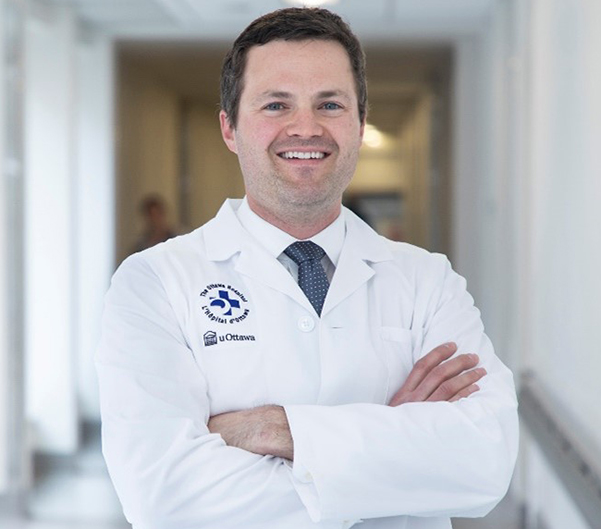“Prehab” helps patients prepare for major surgery

Would you take an exam without studying? Run a marathon with no training? The answer is likely no. So why do we undergo major surgeries without preparing our minds and bodies in advance?
Prehabilitation is the idea that patients can “train” ahead of major surgeries like cancer surgeries or hip replacements to speed up their recovery. “Prehab” includes exercise and nutrition coaching to help patients get into better physical health ahead of their planned surgery. It also includes psychosocial interventions to improve mood or motivation, as well as cognitive interventions that challenge the brain to boost function and reduce confusion after surgery, particularly in older adults.
Dr. Daniel McIsaac, an anesthesiologist and scientist at The Ottawa Hospital, is collaborating with researchers, clinicians, and patient partners to assess and test different prehab interventions, such as increasing protein in the diet. In a CIHR-funded review of nearly 200 prehab programs worldwide, involving more than 15,000 patients, Dr. McIsaac’s team found that high-quality prehab programs led to faster physical recovery, reduced hospital stays and health care costs, and better health-related quality of life for patients who meaningfully engaged with the programs.
For the next phase of the research, Dr. McIsaac and his team are trialing home-based virtual prehab programs for patients with a range of planned surgeries at hospitals across Canada. “We know that patients want to get prehab at home,” says Dr. McIsaac. “It’s far more accessible if you think about the average surgical patient in Canada who lives somewhere between 40 to 90 kilometers away from the place where they’re going to have surgery.”

One of these patients is Chris Wanczycki, who participated in Dr. McIsaac’s prehab trial to build back some of the strength he lost to chemotherapy and radiation ahead of major surgery to treat rectal cancer. For two months leading up to his surgery, Chris participated diligently in a program that included cardio training, stretching, and strengthening. “When I went in for my surgery, I was in much better condition to handle it,” he says, having worked his way up to more than an hour of exercise per day and even went cross-country skiing the day before his surgery. “It accelerated my recovery big time,” he notes.
Prehab is also helping patients to make the most of the wait time before surgery, a time that can be particularly stressful. Chris Wanczycki found that it helped his mental wellbeing to focus on getting stronger and push himself to meet these daily goals. “Let’s use this time before surgery to get patients into better shape, better nutritional status, feeling better, so that when they get to the operating room, they’re starting from a higher point,” explains Dr. McIsaac.
The goal of Dr. McIsaac’s ongoing research is to determine the most effective combination of prehab tools and the best delivery model to better support patients.
At a glance
Issue
Major surgery takes a toll on the body, leading to lengthy hospital stays and long recovery periods.
Research
With CIHR funding, Dr. Daniel McIsaac and his team are studying prehabilitation programs to prepare patients for surgery through a combination of exercise, nutrition, psychosocial and cognitive interventions.
- Date modified: